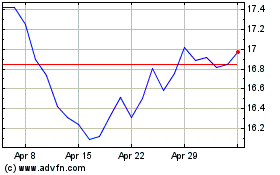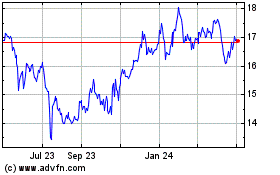AT&T's Tab Awaiting Time Warner Takeover Hits $1.4 Billion
April 26 2018 - 3:49PM
Dow Jones News
By Drew FitzGerald and Sam Goldfarb
WASHINGTON -- Even if a federal judge sides with AT&T Inc.
in its fight to take over Time Warner Inc. for $85 billion, victory
won't have come cheap.
AT&T spent $1.1 billion last year on debt interest and fees
tied to the proposed merger, plus $214 million on related
integration costs. The first quarter added another $67 million of
integration costs. Time Warner said it spent $279 million on merger
costs in 2017 and another $146 million through March.
Those figures don't include the full cost of staffing the trial,
which kicked off in March after the Justice Department sued late
last year to block it, arguing the combination would hurt pay-TV
competition. The companies denied the government's allegations and
added attorneys from at least six white-shoe law firms to defend
the tie-up in one of the most-watched antitrust cases in
decades.
The meter has kept running for AT&T over the past five weeks
at the E. Barrett Prettyman federal courthouse in Washington. On
most weekdays, a convoy of Chevy Suburbans rumbles across town from
the Four Seasons and other hotels to let off about a dozen
attorneys at the courthouse, where they join another dozen or so
colleagues already inside. For busy days, company lawyers watching
but not arguing the case rely on local residents paid $15 an hour
to save them a spot in line overnight.
The team of newly hired and in-house lawyers have filled the
well of judge Richard Leon's courtroom, the pews behind it and,
during crowded sessions, an overflow room next door. AT&T
staffs a separate Washington "legal operations center" nearby while
court is in session.
Executives have done little to hide their discomfort with the
wait. They argue that the companies could save money by merging
operations sooner, helping drive down prices in the pay-TV
market.
"The only lack of competition as a result of this transaction
has been the delay of getting it to the marketplace," AT&T
Chairman and Chief Executive Randall Stephenson testified earlier
this month. "We're just anxious to get moving and get this
transaction put together so we can begin to bring these consumer
benefits to play."
The added interest payments and legal fees only raise the stakes
for two companies betting on the marriage of video content and
distribution to juice their earnings as their core businesses face
pressure from "cord-cutters".
Shares of both AT&T and Time Warner fell Thursday after
their latest quarterly results. AT&T reported fewer
satellite-TV customers, while Time Warner reported that higher
programming costs weighed on operating income at HBO and
Turner.
AT&T's original agreement, struck in October 2016, didn't
plan for a merger review lasting more than a year-and-a-half.
AT&T issued about $30 billion of bonds last summer to fund
the purchase. Most of that debt included language requiring the
company to buy the bonds back at a premium of 101 cents on the
dollar if the deal didn't close by April 22. That date came and
went, likely costing AT&T around $200 million in premiums, said
Mary Pollock, a senior analyst at the research firm
CreditSights.
The redemptions still help by keeping the company from having to
pay interest expense on debt that it doesn't need as long as it
hasn't closed the Time Warner deal, Ms. Pollock added. AT&T had
nearly $49 billion of cash at the end of the first quarter, giving
it more than enough to buy back the debt.
If it is allowed to close the Time Warner deal, AT&T likely
will need to issue a second round of bonds that could pay higher
interest rates than the original debt. The average yield on
investment-grade corporate bonds has increased to 3.97% from 3.14%
since AT&T sold dollar-denominated bonds to fund the deal last
July, according to Bloomberg Barclays data.
Regardless of whether it prevails in court, the deal's costs
will likely saddle AT&T with added expenses for several
quarters, according to Vijay Jayant, an analyst for Evercore ISI.
Then again, he said, "given the size of the transaction, this is a
drop in the bucket."
Write to Drew FitzGerald at andrew.fitzgerald@wsj.com and Sam
Goldfarb at sam.goldfarb@wsj.com
(END) Dow Jones Newswires
April 26, 2018 15:34 ET (19:34 GMT)
Copyright (c) 2018 Dow Jones & Company, Inc.
AT&T (NYSE:T)
Historical Stock Chart
From Mar 2024 to Apr 2024

AT&T (NYSE:T)
Historical Stock Chart
From Apr 2023 to Apr 2024
